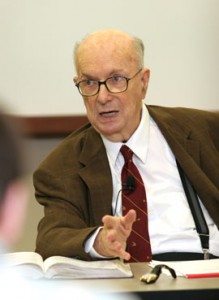Dorsey v. United States: So Long, Saving Statute?
Last month, in Dorsey v. United States (No. 11-5683), the Supreme Court resolved an important circuit split on the interpretation of the Fair Sentencing Act of 2010. The FSA softened the controversial mandatory minimum sentences for crack cocaine offenses that have been in place since 1986. There’s no question that crack offenders who committed their crimes after the statute’s effective date, August 3, 2010, benefit from the new regime. However, the lower courts have divided over the handling of crimes committed before the effective date, but sentenced after it. Although this may sound like a minor dispute, given the volume of crack offenses prosecuted in federal court and the eleven-month median time between indictment and sentencing in these cases, there may be hundreds or thousands of defendants who are affected by its resolution.
Such timing questions are often resolved by reference to the federal “saving statute” of 1871 (1 U.S.C. §109), which indicates that the law in place at the time of an offense should normally govern the penalty. However, this is only a default principle; earlier Supreme Court decisions indicate that Congress can make reduced penalties applicable to all defendants if Congress demonstrates such an intent either expressly or by necessary implication. Since the FSA did not expressly address the question one way or another, Dorsey turned on the finding of implied congressional intent. By a narrow 5-4 margin, the Court decided that Congress had indeed intended to make the FSA applicable to all defendants sentenced after the statute took effect.
People Who Have Shaped the Teaching Careers of Our Faculty—Part 5: Walter Weyrauch, Mentor and Friend
The editors of this blog have asked a number of faculty members to write about those who have been influential in their understanding of the law. In this, the fifth post in the series, Professor Alison Barnes writes about her mentor and friend, Walter O. Weyrauch (1919-2008), who was Professor of Law at the University of Florida and Honorary Professor of Law at Johann Wolfgang Goethe University in Frankfurt am Main, Germany.
 Walter Weyrauch remains a unique thinker in the law, known by many worldwide, and for more than two decades since I took his classes at University of Florida, my principal guide and inspiration in law and law teaching. Our dialogue, which included hundreds of snail mail letters on goofy art note cards, reflected Walter’s world view and legal philosophy, and confirmed and developed mine.
Walter Weyrauch remains a unique thinker in the law, known by many worldwide, and for more than two decades since I took his classes at University of Florida, my principal guide and inspiration in law and law teaching. Our dialogue, which included hundreds of snail mail letters on goofy art note cards, reflected Walter’s world view and legal philosophy, and confirmed and developed mine.
In demeanor, he had an impassive face and long pauses. What seems a dissonance in style became cause for student comment towards the very end of his teaching career. He said of his student evaluations: “They noticed I have a German accent” for the first time since he began to teach at University of Florida 50 years before. His chuckle over this was signature. Indeed, perception of him had evolved from the days when he was rumored to have been a lieutenant in the Luftwaffe. (Chuckle.) Well into his eighties, he negotiated his retirement three years away. He said, “I thought I would be ready; I am not ready.” In part, he feared he would have too much time to reflect on unresolved feelings about his own experience.
Walter provided to me two versions of his memoirs, one hard copy (typed on his manual typewriter) and a later electronic revision, scanned in by his assistant, for my editing. He had received annotations from several scholars, but these were the last so I have worked with them and hope they will be available for any who wish to read, search for their own names, comment.

